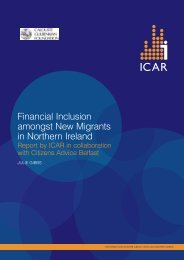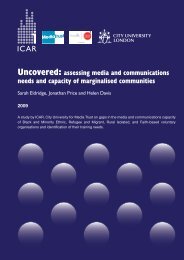Navigation guide Refugee populations in the UK: Algerians - ICAR
Navigation guide Refugee populations in the UK: Algerians - ICAR
Navigation guide Refugee populations in the UK: Algerians - ICAR
Create successful ePaper yourself
Turn your PDF publications into a flip-book with our unique Google optimized e-Paper software.
significant factor <strong>in</strong> <strong>the</strong>ir decision to leave. A young student described <strong>the</strong> sort of occurrence that was<br />
relatively widespread, at least <strong>in</strong> <strong>the</strong> region around Algiers, for much of <strong>the</strong> 1990s:<br />
‘To go to <strong>the</strong> university <strong>the</strong>re are two buses and one day I took <strong>the</strong> first bus. We heard a huge explosion<br />
beh<strong>in</strong>d us, it was <strong>the</strong> second bus that had blown up. The w<strong>in</strong>dows of <strong>the</strong> bus had all smashed. We saw <strong>the</strong>se<br />
people run towards us, some of <strong>the</strong>m wounded, but we couldn’t move. There were twenty or so dead and a<br />
lot of <strong>in</strong>jured. I’ll never forget it, when you see that you th<strong>in</strong>k “and if that was me, <strong>in</strong> <strong>the</strong> second bus…if I’d<br />
been a bit slower this morn<strong>in</strong>g.”’ 27<br />
Expla<strong>in</strong><strong>in</strong>g <strong>the</strong> conflict<br />
Even <strong>the</strong> most basic facts of <strong>the</strong> current conflict <strong>in</strong> Algeria are contested. The <strong>in</strong>itial controversy centred on<br />
<strong>the</strong> army’s motives for cancell<strong>in</strong>g <strong>the</strong> 1992 elections. The army argued that it was act<strong>in</strong>g to protect <strong>the</strong><br />
democratic process from a party that did not respect democracy. 28 O<strong>the</strong>rs refer to a coup d’etat and see <strong>the</strong><br />
cancellation of <strong>the</strong> election as <strong>the</strong> result of <strong>the</strong> efforts of a particular section of <strong>the</strong> political elite to cl<strong>in</strong>g to<br />
power. 29 The controversy surround<strong>in</strong>g <strong>the</strong> role of <strong>the</strong> Algerian government <strong>in</strong> <strong>the</strong> conflict has cont<strong>in</strong>ued ever<br />
s<strong>in</strong>ce with a range of accusations of army <strong>in</strong>volvement <strong>in</strong> kill<strong>in</strong>g civilians, particularly <strong>in</strong> <strong>the</strong> massacres of<br />
1997 and 1998. There can be no doubt that <strong>the</strong> government has been complicit <strong>in</strong> a series of human rights<br />
abuses 30 but some observers argue that this is an <strong>in</strong>evitable consequence of <strong>the</strong> ‘transition to democracy’<br />
that began <strong>in</strong> 1989. 31 The suggestion that <strong>the</strong> army actively took part <strong>in</strong> massacres of civilians is obviously a<br />
far more serious charge. It was first raised <strong>in</strong> books by a survivor from one of <strong>the</strong> massacres 32 and later by<br />
an army officer 33 and, though some commentators have found no fur<strong>the</strong>r evidence to support <strong>the</strong>ir claims 34 ,<br />
o<strong>the</strong>rs argue that <strong>the</strong>y still cast serious doubt on <strong>the</strong> issue and <strong>the</strong> army must at least answer <strong>the</strong> charge of<br />
why it failed to <strong>in</strong>tervene <strong>in</strong> <strong>the</strong>se massacres. 35<br />
These allegations have not gone away and fur<strong>the</strong>r publications, mak<strong>in</strong>g similar allegations have cont<strong>in</strong>ued to<br />
appear, written by former members of <strong>the</strong> Algerian armed forces. 36 Attempts by members of <strong>the</strong> Algerian<br />
government to respond to <strong>the</strong>se allegations <strong>in</strong> <strong>the</strong> French courts have so far been unsuccessful 37 and <strong>in</strong><br />
February 2004 <strong>the</strong> trial of ‘X’ opened <strong>in</strong> Paris, relat<strong>in</strong>g to a prosecution brought by family members of seven<br />
monks who were killed <strong>in</strong> Algeria <strong>in</strong> 1996. The deaths of <strong>the</strong> monks are officially attributed to GIA, though<br />
27 Collyer, M. (2002) ‘Expla<strong>in</strong><strong>in</strong>g change <strong>in</strong> established migration systems: <strong>the</strong> movement of <strong>Algerians</strong> to France and<br />
<strong>the</strong> <strong>UK</strong>’ University of Sussex, DPhil <strong>the</strong>sis, bound and recorded at <strong>the</strong> British Library.<br />
28 Taheri, A. (1998) ‘Entretien avec le général X: Algérie: Les grands cimeterres sous la lune.’ Politique Internationale<br />
79, pp. 11-32.<br />
29 Addi, L. (1999) ‘L’armée, la nation et l’Etat en Algérie’ Confluences 29, pp. 39-47.<br />
30 Criticisms of <strong>the</strong> Algerian government’s human rights record are extensively documented <strong>in</strong> a range of reports from<br />
Amnesty International and Human Rights Watch and are raised <strong>in</strong> two UN reports on Algeria <strong>in</strong> 1998 [all accessed 5<br />
May 2004].<br />
31 Djerbal, D. (1998) ‘Algérie: La Communauté Internationale et les Droits de l’Homme: Entre Sovera<strong>in</strong>été et Droit<br />
d’Ingerence.’ Monde Arabe Maghreb Machrek 162 pp. 119-124.<br />
32 Yous, N. (2000) Qui a tué à Bentalha Chronique d’un massacre annoncé. La Decouverte, Paris.<br />
33 Souaidia, H. (2001) La Sale Guerre. La Découverte, Paris.<br />
34 Stora, B. (2001) La Guerre Invisible Algérie, années 90, Presses de Science Po, Paris.<br />
35 Roberts, H. (2003) Algeria <strong>the</strong> battlefield 1998-2002: studies <strong>in</strong> a broken polity. Verso, London.<br />
36 Aboud, H. (2002) La Mafia des Généraux Lattes, Paris; Samraoui, M. (2003) Chronique des Années de Sang.<br />
Denoël, Paris.<br />
37 General Khaled Nezzar sued <strong>the</strong> author of La Sale Guerre, Habib Souadia, <strong>in</strong> 2002. The judge was careful not to<br />
make <strong>the</strong> test <strong>the</strong> truth of <strong>the</strong> <strong>in</strong>terpretation of events given by each side but <strong>the</strong> verdict none<strong>the</strong>less found <strong>in</strong> Souadia’s<br />
favour and was <strong>in</strong>terpreted as an embarrassment for <strong>the</strong> Algerian government. The proceed<strong>in</strong>gs of <strong>the</strong> trial have been<br />
published as Le Proces de la ‘sale guerre’ Algérie: Le General-Major Khaled Nezzar contre le Lieutenant Habib<br />
Souadia. La Decouverte, Paris (2002).<br />
<strong>Navigation</strong> <strong>guide</strong> to refugee <strong>populations</strong>: <strong>Algerians</strong><br />
©<strong>ICAR</strong> 2004, moral rights Michael Collyer<br />
14

















